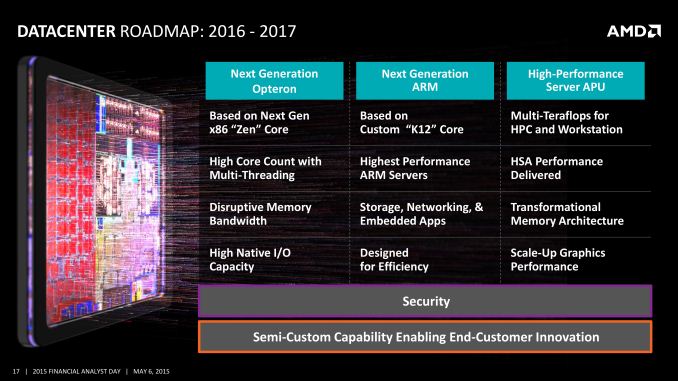AMD tackles datacenter silicon strategy with new chips
x86, ARM and server processor roadmap

At its Analyst Day event, AMD showcased its datacenter computing strategy with three new chipsets covering the x86, ARM and server space. The company expects to release the products in this strategy over the next few years.
"We are focusing our investments on our strongest opportunities to enable our customers to create great products that push the boundaries of what is possible and allow AMD to achieve profitable growth in the years to come," said AMD President and CEO Dr. Lisa Su in a statement.
AMD expects that the datacenter silicon market will total over $10 billion.
Zen
At the heart of AMD's new x86 CPU strategy is Zen, a high performance processor featuring simultaneous multithreading, high-bandwidth, low latency caches and improvements to efficiency.
Mark Papermaster, senior vice president and chief technology officer, AMD, claims that Zen will address the latency issues of the prior generation Bulldozer chips. AMD says that Zen features a completely new high-performance core design that allows for high throughput with simultaneous multithreading.
Moving to a FinFET design, the Zen chip will be built on either a 14- or 16nm process and can handle 40% more instructions per cycle. AMD has not released information about clock speed yet.
K12
K12 is AMD's next-generation ARM processor that is expected to be ready by 2017. Unfortunately, with the K12 announcement, AMD confirms it is abandoning its ambitious plans for Skybridge.
Are you a pro? Subscribe to our newsletter
Sign up to the TechRadar Pro newsletter to get all the top news, opinion, features and guidance your business needs to succeed!
The original intent of Skybridge is to have ARM and x86 chips share the same socket design on what AMD labeled as an "ambidextrous design framework." The pin-compatible 20nm ARM and x86 chips were slated for a 2015 launch, but given that we haven't heard anything of the project it isn't surprising to see AMD can plans for Skybridge.
AMD did not disclose specifics about K12, but we know that the chipset will be based on the 64-bit architecture of the ARMv8 design.
In the interim, AMD will release the Opteron A1100 Seattle ARM processors, which comes with ARM TrustZone support for added security.
Server APU
The last prong of AMD's three-pronged approach to datacenter silicon is a high-performance server APU. AMD claims that the server APU offers multi-teraflops of computing power designed for high-performance computing and workstations.
Other key features of the server APU include a new memory architecture and improved graphics performance.
It sounds like AMD may be leveraging its experience with high-end graphics to create a powerful server APU. The company also announced the FirePro S9150, a GPGPU that can support multiple 4K displays. AMD claims that this is the only GPU on the market to support SR-IOV virtualization.
- Read our feature explaining why processor size matters